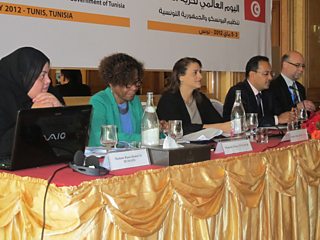
Panel discussion: Media and Public Engagement: Understanding and Engaging 21st Century Societies
James Deane World Press Freedom Day: Βι¶ΉΤΌΕΔ Media Action’s Director, Policy and Insight teams, reports from the UNESCO event in Tunis.
World Press Freedom Day always heralds feelings of inspiration and desperation. I am writing this from Tunis where a UNESCO conference celebrating – or commemorating – the day is about to wind up. I have been fortunate to attend four international conferences of this kind. In every case you hear extraordinary stories of the courage of individuals working in the public interest and being killed, maimed or ruined.
Tunis - cradle of the Arab Spring - is the obvious and fitting venue for this year's conference. Hearing the infectious passion of some of the leaders of that effort – particularly the rousing opening speech by Tawakkol Karman, Nobel Peace Laureate for 2011, is a privilege.
Βι¶ΉΤΌΕΔ Media Action will be moving offices in June as the Βι¶ΉΤΌΕΔ is leaving Bush House, the building that has been the home of Βι¶ΉΤΌΕΔ World Service for 80 years. We are moving the Βι¶ΉΤΌΕΔ complex in west London while our Βι¶ΉΤΌΕΔ World Service colleagues are moving to a new development at Broadcasting House in the centre of London.
On the top of Broadcasting House to more than 30 journalists killed working on behalf of the Βι¶ΉΤΌΕΔ. Every night at 10pm – to coincide with the main domestic evening news – it shines a light almost a kilometre into the sky. It is a real beacon for freedom of expression.
At Βι¶ΉΤΌΕΔ Media Action, a central area of our work focuses on media freedom. In part this is because of our connection to the Βι¶ΉΤΌΕΔ. Media freedom is not just curtailed by the dangers facing our Βι¶ΉΤΌΕΔ colleagues and those they work with. Sporadically Βι¶ΉΤΌΕΔ signals are jammed – there are current problems for instance regarding the black out of Βι¶ΉΤΌΕΔ World News in China.
And we know what can happen when the free flow of trusted information is made available to people who have never had it. Here in Tunis there is recognition that it was not media or new technologies that brought about change – the people of Tunisia and elsewhere did that.
We also know that Βι¶ΉΤΌΕΔ, and other media organisations reporting on the Arab Spring, depended on the torrent of videos, citizen reports and photos flowing from activists in the region.
But the relationship was two way. The increased access via satellite of news channels such as the Βι¶ΉΤΌΕΔ was a key reference point for those activists. A survey by the found that the most common links on 35,000 Arab blogs (after YouTube and Wikipedia) were to al-Jazeera, Βι¶ΉΤΌΕΔ Arabic Television, and al-Arabiya.
And we know the risks faced by others we work with. Some of the most moving stories are those of the less well known journalists killed in the course of raising issues of injustice or abuses of power, especially those working outside the cities or working in vernacular and non-mainstream media. Hearing the story of Uma Singh, a 24-year-old journalist killed in rural Nepal when she tried to investigate who was responsible for the death of her brother and father was particularly distressing.
A belief in media freedom is one thing that drives us as an organisation. But the other is audiences or - as we would put it - people. How do we best understand and measure media freedom? Support to media and media freedom has mostly focused on support to organisations, to institutions and to individuals. Traditional thinking in this area asks: how independent is the media, how sustainable is it, how skilled is it, how professional is it?
But there is less assessment of how trusted media is, how media covers and relates to the issues that concern people the most, how useful is media’s ability to be used as an accountability mechanism in society? These are increasingly the issues that preoccupy us.
Βι¶ΉΤΌΕΔ Media Action works with the Βι¶ΉΤΌΕΔ and with other partners to support media around the world, and to engage people – particularly the most marginalised people – in public debate and provide information for them on issues that affect their lives.
We have always placed a high premium on research as an organisation. Researching and understanding the political, social and economic realities of the countries in which we are working is something we are taking ever more seriously.
So too is our increased focus on understanding the information and communication needs of people we work to reach. A core Βι¶ΉΤΌΕΔ value states 'Audiences are at the heart of everything we do'. This is reflected in our fundamental focus on research and understanding the information and communication needs of the people our programming is designed to engage and reach. At Βι¶ΉΤΌΕΔ Media Action we employ around 80 people around the world focused on understanding information and communication needs of people and working out how we can best respond to them and how effectively we can meet their needs.
Just as we strive to support the needs of the individual journalist so too do we want to support the needs of the individual audience member, especially the most marginalised and disenfranchised. World Press Freedom Day has again reminded me what a critical role there is to play in addressing both priorities.
